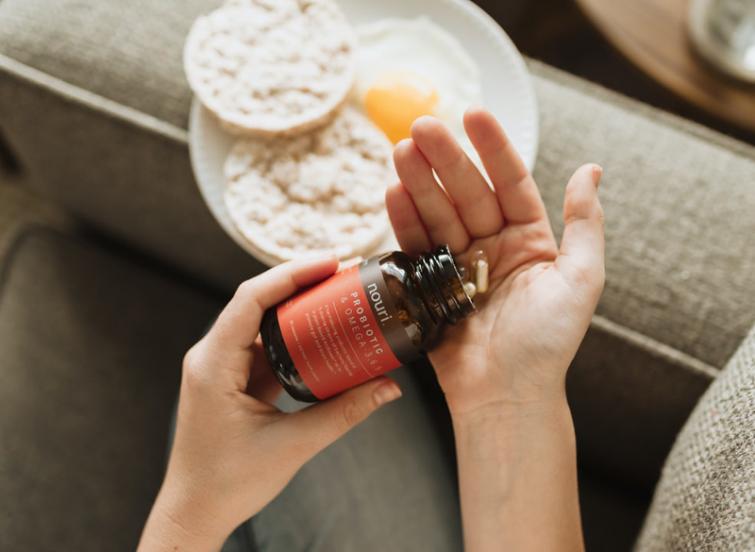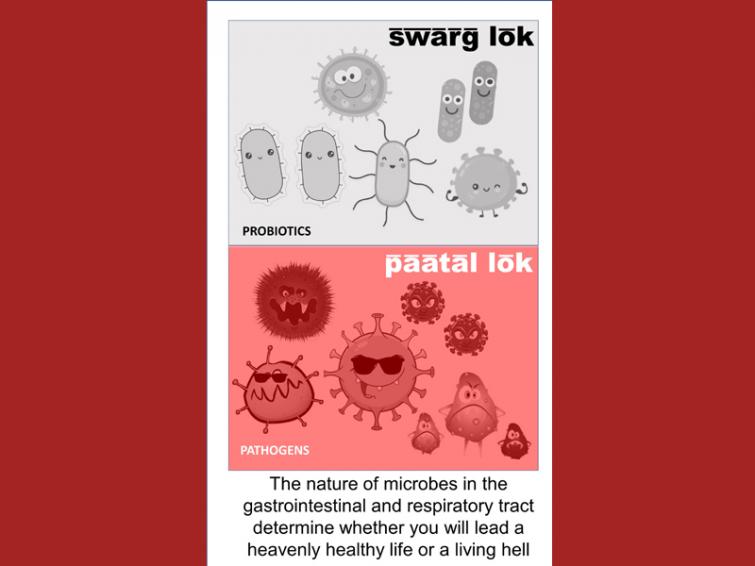
Can Probiotics confer protection against COVID-19?
Imagine you have boarded a bus and found that all the seats have already been occupied. Let’s further imagine that you start fighting with the ones already seated. Sounds absurd? Well, this is pretty much what happens when a foreign microbe enters inside the body of the host.
It not only triggers a series of immune responses but also a war between the incoming microbe and existing members of the microbial community inhabiting the host.
They fight with each other, competing for nutrients and space for colonization. Let us discuss the brief story of how the host microbiome possibly interacts with COVID-19 virus and its influence on the host’s health.
It is estimated that the gastrointestinal and respiratory tract harbours millions of bacterial cells. The nature of this microbiome plays a pivotal role in determining the fate of intruding pathogenic microbes and their subsequent effects on health outcome.
To elaborate, just as ‘good deeds beget good deeds’, presence of good bacteria viz probiotics’ prevent the colonization of incoming foreign harmful bacteria or pathogens. On the other hand, a greater relative proportion of harmful pathogenic bacteria in the host will favour colonization by pathogens.
In-vitro studies have corroborated growth inhibitory effects of probiotic strains against several viruses such as― vesicular stomatitis virus, rotavirus, Newcastle disease virus, infectious bursal disease virus, influenza virus, enterovirus, etc.
Several clinical studies have evinced that consumption of probiotics could prevent the incidence, reduce the duration as well as the severity of several acute viral respiratory infections. Additionally, these studies associated probiotic intervention with lower usage of
concomitant drugs as well as antibiotics.
Although till date, there has been no published research that throws light upon the interaction of COVID-19 virus and probiotics, there is speculation regarding its
beneficial therapeutic ability based on circumstantial evidence generated from research pertaining to the antiviral activities of probiotics.

China's National Health Commission and National Administration of Traditional Chinese Medicine (2020), have set guidelines for the hospitals to administer probiotics to the patients being treated for the novel coronavirus.
Now the important question is what enables the probiotics with health-promoting attributes? Whilst there is still ambiguity regarding the mechanism, studies suggest the following plausible mode of actions.
Probiotics interact with the other dietary components (carbohydrates. fibre, protein, fats, polyphenols etc,) and generate a variable range of simpler products or ‘metabolites’ (proteins, fatty acids, hydrogen peroxide, nitric oxide, etc). These metabolites have been found to have significant antiviral potential, i.e- they inhibit the growth of harmful viruses.
The probiotics compete against pathogens for receptors on the mucosal surface of the respiratory and gastrointestinal tracts. They synthesise proteins that enable them to adhere to the proteins of viral cell and/or to the host mucosal lining thereby preventing colonization of viruses.
Probiotic administration has also been associated with the promotion of balanced and functional immunity as indicated by increased production of the defense molecules by the body such as antibodies and helper T cells, antiviral cytokines (IFN-γ, IL-12) as well as lower levels of inflammatory cytokines.
As per reports, improvement of gut microbiota facilitated the prevention of secondary infection in Corona patients. Probiotic intake improves the health of colon cells and enhances gut-mucosal integrity. Tightly sealed intestinal walls can prevent leakage of any toxin or virus/ bacteria into the blood.
Therefore, all the evidence generated hitherto indicates regular intake of probiotics could be beneficial in the prevention of virus borne diseases along with home quarantine and maintenance of proper hygiene.
Various probiotic food products: yoghurt, curd, health drinks, tablets etc., can be consumed daily for up-regulating the immunity. It must be understood that this article discusses the suitability of probiotic intake as an adjuvant therapy against the novel Coronavirus but does not guarantee protection against it.
(Arpita Banerjee is a Senior Research Fellow (UGC) Food and Nutrition, University of Calcutta. Dr. Pubali Dhar is Associate Professor, Laboratory of Food Science andTechnology, Food and Nutrition division, University of Calcutta; Head, Dept. of Home Science, University of Calcutta)
Support Our Journalism
We cannot do without you.. your contribution supports unbiased journalism
IBNS is not driven by any ism- not wokeism, not racism, not skewed secularism, not hyper right-wing or left liberal ideals, nor by any hardline religious beliefs or hyper nationalism. We want to serve you good old objective news, as they are. We do not judge or preach. We let people decide for themselves. We only try to present factual and well-sourced news.







